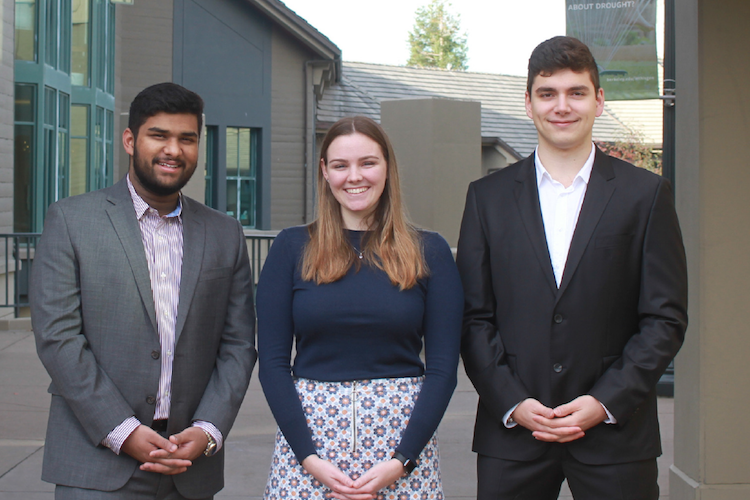
Pictured from left to right are Shane Puthuparambil, Berklee Welsh, and Tim Tembrink. UC-Berkeley Haas photo
As Tim Tembrink’s senior year began at the University of California-Berkeley Haas School of Business, he started down a deep research hole. Interested in launching his own sustainable clothing company, Tembrink, a German native who transferred to Haas after graduating from Santa Barbara City College, searched out and consumed whatever sustainability reports from other clothing companies he could get his hands on. Then a thought crossed his mind: Does UC-Berkeley or the Haas School of Business produce similar sustainability reports? The answer was a hard no.
So Tembrink, who also serves as VP of sustainability for the HBSA Sustainability Committee at Haas, brought it up at a committee meeting.
“We decided that we wanted to work on an expansive project, so that we could potentially bring sustainability-related data and issues to the general Haas community and the rest of the UC-Berkeley community as a whole,” says Shane Puthuparambil, an 18-year-old freshman at the school. “So we decided to work on the sustainability report.”
Puthuparambil and Tembrink joined Berklee Welsh, a junior at the Haas School, and they embarked on a project to do just that. After a semester of work, the trio published the school’s first-ever sustainability report last month, which Tembrink calls “a benchmark for what can be done and what should be done moving forward.” The 24-page report looks at just how the school is doing in terms of water and energy consumption, the usage of food, and waste diversion.
“We find that reports such as this one serve as benchmarks for past performance and starting points for further improvements,” the authors write in the introduction to the report. “We hope this sustainability report brings the Haas community one step closer to realizing the importance of measuring and evaluating sustainable performance just as diligently as financial performance and other metrics. Sustainable performance must be accounted for and analyzed in light of the ever changing challenges that the business community faces.”
CHOU HALL, NAMED ‘GREENEST ACADEMIC BUILDING’ IN THE U.S., IS HIGHLIGHT OF REPORT
Highlighting the report is Haas’s newest building, Chou Hall. The six-story, 80,000-square-foot building took $60 million to construct and was recently named the country’s “greenest academic building” after earning TRUE Zero Waste certification last month. Since opening its doors, Chou Hall “has set new sustainability standards for academic buildings around the world,” the report reads. So far, it’s the only academic building in the U.S. to be designed to meet LEED Platinum standards and to earn WELL certification — essentially the sustainability-geek way of saying it’s a really cool game-changer.
The report compared energy and water usage and food and waste diversion across all buildings in the Haas complex, and across the board Chou Hall out-performed the others — and it wasn’t close. “The water-efficiency measures implemented in Chou Hall have exceeded expectations,” the report reads. “Chou Hall uses about half as much water per square foot as the rest of the Haas complex.” Moreover, Chou Hall is home to an 11,000-gallon cistern for rain water collection. Once enough rain water is harvested, the building will be able to full power its own restroom water.
Another feature of Chou Hall, highlighted in the report, is Cafe Think, the second-story restaurant in the building. Only reusable, recyclable, or compostable materials are used at the cafe, which has been Green Business Certified by Alameda County. Plus, all produce is sourced from within 250 miles of the school, taking advantage of nearby agricultural hotbeds in California’s Central and Salinas Valleys.
A BENCHMARK FOR FUTURE EVALUATIONS AND STANDARDS
Moving forward the team hopes Haas will continue to produce annual reports and use this inaugural one as a benchmark and stepping stone. They also hope to see the greater UC-Berkeley community as well as other leading business schools adopt their own reports and standards.
“A great foundation has been laid by the business school, and its students and faculty continue to forge positive change. Berkeley Haas has the infrastructure, resources, and determination necessary to continue its path to lead business schools around the world with regards to social impact and sustainability,” the report reads. “Business leaders and business schools should make incorporating sustainability into their decision making a top priority. As a leading business school, Berkeley Haas has the responsibility to innovate in the field of sustainably so other schools and businesses can follow.”
Two of the school’s most influential leaders in sustainability concur.
“We stand at a critical point in history. The sustainability challenges confronting the world are significant and mounting faster than anticipated,” interim Dean Laura Tyson and Executive Director of the Berkeley Haas Center for Responsible Business Robert Strand wrote in a letter at the beginning of the report. “Berkeley Haas is well positioned to assume a leadership role among business schools to address these challenges and leverage the power of business to drive positive change.”
DON’T MISS: HOMELESS TO HAAS: UC-BERKELEY’S TECH TWINS or LAURA TYSON NAMED INTERIM DEAN AT UC-BERKELEY HAAS











Questions about this article? Email us or leave a comment below.